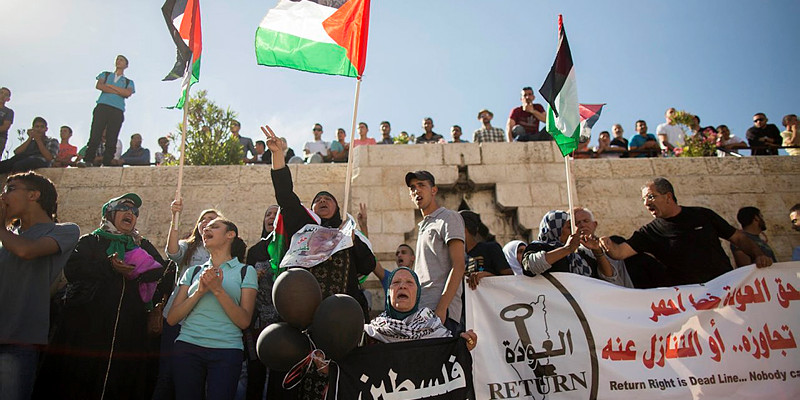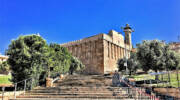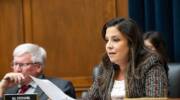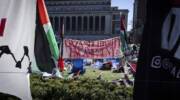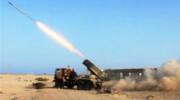A narrative of deceit dating back to the fall of the Ottoman Empire.
By Hugh Fitzgerald, FrontPage Magazine
Along with “apartheid” used as an adjective – as in “Israel is an apartheid state” – haters of Israel have taken to referring to the “Nakba,” the Arabic word for “catastrophe.”
The “Nakba” is the word the Arabs now use to describe the failure in the 1948 war of five Arab armies to destroy the Jews of Israel, by expelling or killing every last one. That, of course, is not how the Arabs put it to the Western world: they claim the “Nakba” refers to the defeat of the Arabs who had intervened only to help their Palestinian brothers hold onto the land that had been theirs for centuries, land that the “Zionist entity” was stealing for itself.
More on the history of the “Nakba” can be found here: “The Nakba Narrative: A History of Deception,” by Chaim Lax, Honest Reporting, May 8, 2023:
“‘The Nakba’ is repeatedly invoked in the media, academic literature, politics, and popular culture surrounding the Israeli-Palestinian conflict. Its appearance is so ubiquitous at this point, that it seems like it has always been part of the general lexicon.
“However, that is not the case.
“Here, we’ll look at the significance of the term ‘Nakba,’ the history of the term from 1948 until the present, how this Arabic term gained popularity around the world, and the new adoption of the term to refer to anti-Jewish persecution by the Arab and Muslim worlds.
“In Arabic, the term ‘al-Nakba’ means ‘the catastrophe.’ In the context of the Israeli-Palestinian conflict, the catastrophe that the ‘Nakba’ is referring to is the founding of the State of Israel in 1948, and the disintegration of Palestinian Arab life in Israel.
“For those who adopt this narrative, the Zionist movement and Israel are solely responsible for the displacement of Palestinian Arabs between 1947 and 1949, while the Arabs themselves are the exclusive victims of the conflict.
“By failing to take into account the Palestinian and Arab refusal to accept a two-state solution in 1947 and the subsequent military attempt to destroy the Jewish state, the Nakba narrative advances the claim of perpetual Palestinian victimhood and serves as a historical basis for the Palestinian ‘right of return.’”
We should never forget that UN Resolution 181, which called for the “partition” of Mandatory Palestine into a Jewish and an Arab state, was accepted – reluctantly – by the Jews desperate for a state, and rejected by the Arabs. This is something the Arabs want us to forget. They had their chance then for an Arab state in “Palestine,” and turned the offer down flat.
Nor were the Palestinian Arabs driven out of “Palestine,” the victims of unbridled Zionist aggression, as we are now told. Starting in late 1947, Arab broadcasters, sensing that the collective might of the Arab states would soon be unleashed on the Jews living in Mandatory Palestine, broadcast into Palestine a message to the local Arabs: they must leave the area where the war would take place, assured that they could then return with the victorious Arab armies, and reclaim not only their own property, but that of the Jews who had been either killed or expelled. Many Palestinian Arabs followed that advice. Some Jews, such as the Mayor of Haifa, implored the Arabs in his city to remain. Not all Jews, of course, were sorry to see the Arabs leave. In the end, about 690,000 Arabs in what was first Mandatory Palestine, and then Israel, left hoping that they would soon be back.
“The term ‘al-Nakba’ first entered the political lexicon of the Arab world in the late 1930s as a reference to the dissolution of the Ottoman Empire and the creation of the modern Middle East in 1920.”
“Nakba” did not begin its lexical life in reference to the Arab loss in the 1948 war, but appeared earlier in reference to the “catastrophe” of the Ottoman defeat by the European powers, the dissolution of the Ottoman empire and the end of the Caliphate.
“The term first became associated with the Israeli-Palestinian conflict in August 1948 (as the Israeli War of Independence still raged on) when Constantine Zurayk, a Syrian academic and diplomat based in Beirut, published a slim volume entitled “Maana al-Nakba” (The Meaning of the Catastrophe).
“In this work, Zurayk blamed Arab leaders for the Nakba (due to their military failures and urging of Arab civilians to flee until after the fighting) rather than an alleged grand premeditated Zionist plan to displace the local Arab population (which later became a standard component of the Nakba narrative).”
In this first use of “nakba” in relation to the Arab defeat, the Syrian diplomat Constantine Zurayk put the blame where it belonged – on the Arab leaders outside Palestine, both for their military failures, and for their encouraging the Arabs of Palestine to flee in order to avoid being harmed in the conflict. Zurayk did not see the “nakba” as the result of a Zionist plan – after all, the Jews had no idea they would win this, the first war they were forced to fight for their very survival. And the fact that some Jews tried to keep the Arabs from leaving showed that there was no grand plan to expel them.
“Zurayk’s Pan-Arab ideology also meant that he did not consider the Nakba to be an exclusive Palestinian catastrophe, but one that primarily affected the larger Arab world.
“In the 1950s, some Palestinian writers such as Aref al-Aref began using the term ‘Nakba’ in their writings while others preferred to use different terms. In a 1956 work, Haj Amin al-Husseini, the former Grand Mufti of Jerusalem, used the term ‘al-Karitha’ (meaning catastrophe/disaster) since ‘al-Nakba’ had a connotation of the fate of Palestinian Arab society in 1948 being self-inflicted.
“In the decades following Constantine Zurayk’s introduction of ‘al-Nakba’ to the Palestinian political lexicon, the term evolved to refer to a narrative that focused exclusively on the Palestinian Arabs (instead of the greater Arab nation) and gradually began to ascribe all blame for the dissolution of Palestinian Arab society to Israeli actions.”
What had begun as simply a description of why the Arabs fled Palestine turned into a tale of Jews driving them out, and the word ‘Nakba’ was taken up to describe this (falsely described) state of affairs. Now the Jews were the sole progenitors of the Arab flight from Palestine; it wasn’t the Arab broadcasts, any more, but Israeli aggressors who were to blame for what was now seen as the “forced expulsion of the Arabs” from “Palestine.”
“In the 1980s, the Nakba narrative gained a significant boon with the appearance of the “new historians,” a group of up-and-coming Israeli scholars who challenged the traditional Zionist account of the events of 1948 and adopted the portrayal of the Israelis as violent aggressors and the Palestinian Arabs as forlorn victims….”
Israeli “New Historians” first appeared in the 1980s; they were eager to overturn “the accepted Israeli narrative” — the one favorable to the Zionists. Some took great delight in being anti-Zionists; in their desire to do so, they turned the history of the Arab-Israeli conflict on its head, painting the Jews as the aggressors and the Arabs of Palestine as victims.
Benny Morris is the best-known of these New Historians, and also one of the least dishonest; he has since deplored the way his own scholarship has been wrongly exploited and has distanced himself from some of his earlier positions.
The two worst “New Historians,” whose studies drip with a deep animus for the Jewish state, are Avi Shlaim and Ilan Pappé. These far-left anti-Zionists have been laughed to scorn by serious historians for their sloppy and tendentious misuse of facts, especially of the effect of such people as the Mufti of Jerusalem and of those Arab leaders, like Azzam Pasha, the Egyptian Secretary-General of the Arab League, who warned of “a war of extermination and momentous massacre which will be spoken of like the Mongolian massacre and the Crusades massacre” to come, and the need for the Palestine Arabs to get out, so other Arabs could get in to expel or kill the Jews. Meanwhile, those Jews in Palestine in 1948 were merely trying to stay alive. Most were desperate people, many of them fresh out of DP camps in Europe, where they had been placed after having survived both the forced labor and death camps of the Nazis.
Now the latest generation of Israeli historians has looked with a critical eye on the New Historians who in the 1980s helped further the “Nakba” narrative; much of their work has been weighed and found wanting.
But the “Nakba” story, which some of those New Historians helped to promote, has taken on a life of its own.
Do You Love Israel? Make a Donation - Show Your Support!
Donate to vital charities that help protect Israeli citizens and inspire millions around the world to support Israel too!
Now more than ever, Israel needs your help to fight and win the war -- including on the battlefield of public opinion.
Antisemitism, anti-Israel bias and boycotts are out of control. Israel's enemies are inciting terror and violence against innocent Israelis and Jews around the world. Help us fight back!
